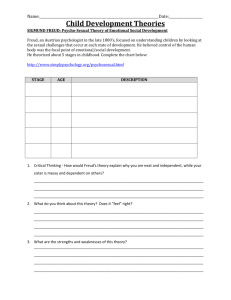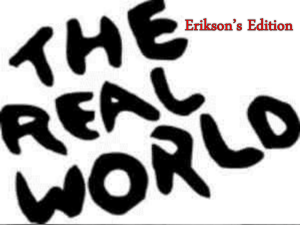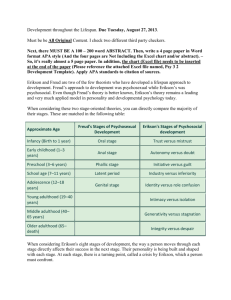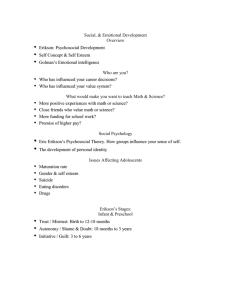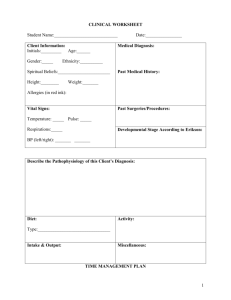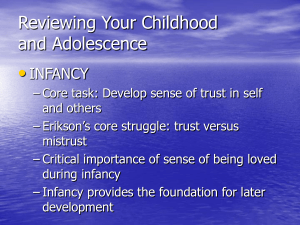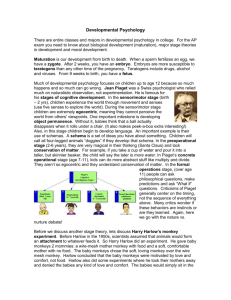Erikson cognitive development.doc
advertisement
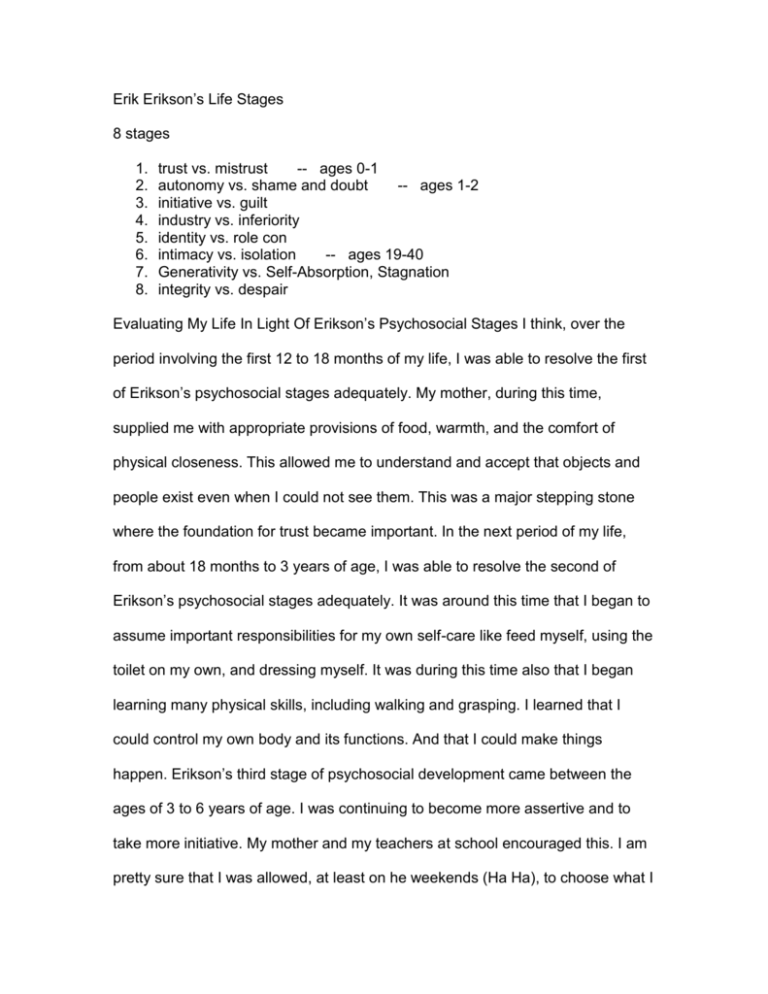
Erik Erikson’s Life Stages 8 stages 1. 2. 3. 4. 5. 6. 7. 8. trust vs. mistrust -- ages 0-1 autonomy vs. shame and doubt -- ages 1-2 initiative vs. guilt industry vs. inferiority identity vs. role con intimacy vs. isolation -- ages 19-40 Generativity vs. Self-Absorption, Stagnation integrity vs. despair Evaluating My Life In Light Of Erikson’s Psychosocial Stages I think, over the period involving the first 12 to 18 months of my life, I was able to resolve the first of Erikson’s psychosocial stages adequately. My mother, during this time, supplied me with appropriate provisions of food, warmth, and the comfort of physical closeness. This allowed me to understand and accept that objects and people exist even when I could not see them. This was a major stepping stone where the foundation for trust became important. In the next period of my life, from about 18 months to 3 years of age, I was able to resolve the second of Erikson’s psychosocial stages adequately. It was around this time that I began to assume important responsibilities for my own self-care like feed myself, using the toilet on my own, and dressing myself. It was during this time also that I began learning many physical skills, including walking and grasping. I learned that I could control my own body and its functions. And that I could make things happen. Erikson’s third stage of psychosocial development came between the ages of 3 to 6 years of age. I was continuing to become more assertive and to take more initiative. My mother and my teachers at school encouraged this. I am pretty sure that I was allowed, at least on he weekends (Ha Ha), to choose what I wanted to wear and was allowed to wear whatever I had chosen. In the fourth stage of Erikson’s psychosocial development, between 6 and 12 years of age, I was learning to see the relationship between perseverance and the pleasure of a job well done. I was physically and mentally ready to be productive and to do work on my own. I also had many friends at this time and understood what friendship was. I believe that having good friends and peers helped me to be productive and succeed in both school and after school activities. In Erikson’s “identity vs. role confusion”, stage 5, from 12 to 18 years of age, I was gaining a sense of my own identity. I was seeing myself as separate from my parents. Due to the outcome and resolution to conflict in earlier stages I was able to make this transition smoothly. I am currently involved in stage 6, young adulthood, from ages 19 to 40. I believe that I have achieved a healthy intimate relationship with my husband. We are both open to one another and committed to each other. We give and share with one another on a daily basis without wanting or expecting anything in return. Although Erikson’s stage7 has a range from 40 to 65 years I believe that I have reconciled many of the issues involved here. Having had my first child 11.5 years ago I have been concerned, and continue to be concerned, with what life will be like for my children when they are grown and have children of their own. I wonder what will be in store for my grandchildren when they are growing old as well. Will the air be clean enough to breathe? Will there be enough food? My goodness there isn’t enough food to feed all the people now. Will there be enough room for them to live? Will they be able to support their families? As for Erikson’s final stage...I look forward to the day when I can look back on my life with a sense of fulfillment and acceptance of the things that I have done with my life and the lives of my children, grandchildren, etc, etc.... In conclusion, I honestly don’t think that I can separate how only three of these stages interact with a later stage. Maybe this was a trick question?! These stages all fit together like building blocks. With one leading directly into the next and building from the previous stage or stages. You need them all to work together, in my opinion, to support each other. I don’t think if I was to have left one stage without an adequate resolution I could have moved on to accomplish the next. Could I? No...I really don’t see how that would work! Erikson I chose to discuss and study Erikson and the eight stages of life. I was reading about different areas to study on, and after reading about Freud, the person, I read a little on Erik H. Erikson. The reason I decided to study the eight stages of life was based on my interest in Erikson the person. I read a little bit on his life and some of his accomplishments and studies, and decided the best thing to write about would be his eight stages of life. Erikson was born in Frankfurt, Germany in 1902. His parents were both of Danish decent. Until the age of three, Erikson was raised solely by his mother, in a “solitude” type situation, because she believed her son to be “special”. His mother remarried to Dr. Homburger a Jewish man, Erikson’s mother was also Jewish, and boys would nick-name Erikson “the goy”, meaning non-Jew. As Erikson grew he was not a very good student, however, he did excel in subjects such as ancient history and art; it was the aspect of formal school he disliked. After general school he did not attend college, he went on a moratorium, where young people travel to find themselves, and who they are. As Erikson’s biographer, Robert Coles, states, Erikson married at 27 years old to Joan Serson and started to raise a family. However, because of the rise of Hitler he was forced to move to Boston, Massachusetts where he became the first child analyst. He received a job at Yale University, and he still enjoyed traveling. He transferred to the University of California, where he started his work expanding on what Freud also studied, in an attempt to take it further. Out of all the work he has compiled, from the three books I read on him, they all concur that his most important work was that of the eight stages of life, that him and in fact Freud both had worked on. “Erikson stretched, patched, and rearranged Freud’s vision in two main ways…. First, He stressed the development of conflict-free ego functions.., and logical thought… Second he moved away from Freud’s biological approach and considered the vast influence of society and development.” (p. 158, Theories of Developmental Psychology, Miller) Erikson not only focused on what Freud studied, but took his own perspective into Freud’s already studied concepts, and applied his thoughts and wisdom to the subject. I will portray all eight stages by first stating the age of the stages, then including Freud’s names for the stages, following that, Erikson’s names for the stages, concluding with what the stage means according to Erikson. The first stage is from birth to one year old, and Freud calls it the “Oral” stage. Erikson’s general stage names it the Trust vs. Mistrust: Hope, stage. Erikson discusses the importance of trust in this stage and how it affects the baby in their early years. Erikson explains that the baby should have some sort of trust, and having trust is healthy for the baby. For example if the baby is well taken care of shown enough attention, when the mother leaves for a moment the baby will not cry, because they know hat the mother will return shortly. However, Erikson also explains that a little mistrust is necessary in order to know people better, and detect those who are deceitful, or not honest. Erikson also discusses how the baby is taking , taking , taking, that is what the baby does, and by receiving what he is being given, in a way, is preparing him to give back to the world later. I see this stage as a “basis stage”, and stage that is the foundation for the baby. I did not read about what would happen if the baby was not given what it needed or wanted, and did not study further on that aspect, however I assume that those babies not given what they want or need, develop mistrust, and in life encounter many problems dating back to those early years that most people never remember. That alone opens a whole different door to psychology, and the study of growth; it was just something that appealed to me, and I dwelled on after thinking about the possibilities of the mistrust aspect. The second stage is from one to three years old, and is referred to by Freud as the “Anal” stage. Erikson refers to this stage as the Autonomy vs. Shame, Doubt: Will, stage. This stage Erikson refers to parent’s and children’s first confrontations. Where the baby is learning so much, walking, talking, becoming into a little person, they know what they like and dislike, and can make that oral. The parents are first starting to realize that the young child is his/her own person. Erikson refers to the positive aspect being autonomy, and the negative aspects being shame and doubt. Erikson also introduces rules, and the children’s first encounter with rules. This stage to me is a very hard stage to endure, for both parents and children. The stage has to do with a lot of growing up, which happens all the time through the relationship between parents and children, however, what makes this harder than the others, to me, is the fact that this is the first time the parents are subject to this, “growing up”. The third stage ranges from three to six years old, and is called the “Phallic (Oedipal)” stage by Freud. This stage is called by Erikson as the Initiative vs. Guilt: Purpose, stage. Erikson refers to this stage as the first time the child realizes he is going to be his own person, and starts thinking about who they want to be. Here Freud and Erikson differ on their views, about achieving identification. Freud believes that identification comes more from sexuality, whereas Erikson believes it comes more from the social aspect of life. This stage I see can be very confusing to a child, finally starting to realize they are their own people, and maybe for the first time realizing that their parents will not be around forever. That must be a difficult aspect to grasp for a child. The next stage, the fourth stage, ranges from six to eleven years old, and Freud names this stage the “Latency” stage. Erikson calls this the Industry vs. Inferiority: Competence, stage. The fifth stage takes place in adolescence Freud’s final stage in the eight stages of life model, known as “Genital” stage. Erikson refers to this stage as the Identity vs. Role Confusion: Fidelity, stage. The sixth stage takes place in young adulthood, and is referred to by Erikson as the Intimacy vs. Isolation: Love, stage. The seventh stage takes place in adulthood, and is called the Generativity vs. Self-Absorption, Stagnation: Care, stage. The final stage takes place with old age, and Erikson calls this stage the, Ego Integrity vs. Despair: Wisdom, stage. By studying this paper I had one strong presupposition that I had corrected. I had thought that one would not have to go through all the stages of life. However, the answer is, according to Erikson’s theory, “…one must, if one lives long enough, go through all the stages. The reason has to do with the forces that move one from stage to stage: biological maturation and social expectations. These forces push one along according to a certain timetable, whether one has been successful at earlier stages or not.” (p.290 Theories of Development: Concepts and Applications William Crain) his to means that biologically things happen in our body, that force us to go through all these stages. Going through these stages, the way Erikson describes, I interpret them to be necessary. That these stages, are not just things that happen, but they are things that have to happen, it is healthy and right for them to take place in our bodies. It is not only a psychological model, but a physical model also. Studying this subject was very intriguing, and helped me to better understand the course of life, and what people go through, throughout life; the “stuff” you cannot see, inside people, that everyone, most people go through. The most important aspect I take from this study is more knowledge of people, both psychologically and physical. Erikson’s theory of psychological development may be proved through my personal experience. Erikson’s stages of development can be seen through most individuals. The first stage Erikson describes is “Trust vs. Mistrust.” The statement present throughout this stage is “I am what I’m given.” This stage lasts usually from birth to 18 months and deals with your needs being met as an infant. If your needs are met, you develop a sense of trust in others and your environment; you become an optimist. If your needs are not met you may experience mistrust, and become negative and assume the worst of others. I think that as an infant, my needs were easily met because now I tend to assume the best of people and I am very gullible. Erikson’s second stage is “Autonomy vs. Doubt.” “I am what I will” is usually the statement associated with this step. At age 18 months to 3 years, you experience autonomy or doubt based on the fact if your parents supported your goals and independence and believed in you. If your parents did not support you, or made you doubt yourself, you may experience doubt. I think I struggled a little bit with this step because though my parents probably supported me throughout this stage, I still have not developed a real sense of independence when it comes to being all alone with no input from others. “Initiative vs. Guilt” is stage three in Erikson’s theory of psychological development and occurs between ages 3 to 6 years. The statement present throughout this stage is “I am what I imagine I will be.” If your parents do not support your imagination and future ambitions, you may experience guilt. If your parents do support you, you feel initiative, or motivation. I feel great motivation in my future goals so I think my parents definitely supported me in this stage. During age 6 to 12 years, Erikson’s stage “Industry vs. Inferiority” comes into play. The statement “I am what I can learn” becomes the defining factor in this stage of development. Education becomes very important as one learns how to make meaningful relationships with others and learn as much as they can. If one does not fulfill these needs, they might feel inferior. I think I easily made it through this stage because at this age I enjoyed learning very much and soaked up information like a sponge. During Erikson’s fifth stage of development, “identity,” there are seven individual areas of development that occur. The first area—time—one either experiences “temporal perspective” or “time confusion.” I think I experienced/am experiencing temporal perspective—I am very happy with the age I am at the moment and I am almost always early or on time for things. The second area, “self image,” is very significant. This is important to like the various selves that make you up as a person so you can gain confidence. If you do, you are said to be “self certain,” however, if you still feel as though you have not fully accepted yourself, you are self-conscious. I think I am mostly self-certain but I still sometimes feel self conscious about my areas of weakness. “Roles” is the third area in Erikson’s fifth stage. This includes “role experimentation” and “role fixation.” I think I did my share of role experimentation, since I dabbled in different areas to see what I would want to go into in college and as a career. In “Work,” the fourth area, it is important to figure out which tasks you want to do to fill up your free time. “Apprenticeship” is done when you find things you are interested in; to spend your time. “Work Paralysis” may be if you know you should be doing things but you are lazy. I think I have definitely found things I enjoy doing in my spare time, including a job, so I know I have experienced “Apprenticeship.” Area 5, “sex,” is obviously also an important area; it involves figuring out the kind of man or woman you want to become, and if you do so, you have experienced “sexual polarization.” If not, you are said to feel “bisexual confusion.” I think I have definitely reached sexual polarization because I have realized the kind of woman I want to be. The seventh area, “involvement” includes “leadership/followership” and “withdrawal.” I think I have definitely experienced leadership/followership because I have cared about something enough to become involved and I do not seclude myself form others. In area 8, “values,” one needs to believe in and feel loyal to something, or have “ideological commitment.” If they do not, it is a “confusion of values.” I have definitely experienced ideological commitment; I feel loyalty to my friends and family. Overall, Erikson’s stages of development play a part in everyone’s individual experiences. My personal experience in these stages is very positive overall though some may never make it through all of the stages until much later in life. SOCIAL AND PERSONAL II The second of a pair, but this time, things are a little different. I have to incorporate the theories we have learned in class, into who I am as a person. The reason I find this difficult is because I am so unnecessarily complicated, and no one thing applies to me, because I am, as I said in the first paper, a kaleidoscope. Here is what I came up with. As far as my moral development goes, I believe I am in the 5th, maybe 6th stage of Kohlberg’s moral development. I have a certain number of morals that I have stuck to, even when things seemed pointless. For instance, I have decided to wait until marriage for intercourse. While morals on this differ, the point is I’m 18 years old in a fully committed relationship of over a year and in college, and I still stick by my guns. People call this being stubborn, I think it’s me standing up for what I believe is right. I also always try to do the right thing...even if it is not always the popular thing. I do my best to stand up for someone, even if this person seems to have no redeeming quality. I once heard in a quote that “the true measure of a man is how he treats someone who can do him absolutely no good”. I don’t have a problem speaking up whenever I think something is wrong, and I wrack my brain whenever I miss the oppurtunity, because in my personal opinion, those who choose to not pick a side during a serious moral crisis are the worst kind of people. My morality is on my terms, my personal conviction, and the more I am here, the more I struggle with that, but continue to try and fight for it. As far as my stage of development in Erikson’s model: I am definitely in Intimacy versus isolation...and I am still somewhat struggling with my identity. Being one of the few girls to arrive here at 17 years old, I felt I was on the same level as many of them, and in truth I am. Your freshman year is about discovering who you are as a person...thus Identity crisis. I have chosen education for my major, and I am POSITIVE that this is what I want to do. All the reasons make sense, my heart tells me this is what I want, but all the same, I begin to become unsure, and sometimes I second guess myself, just because I am insecure about who I am, and what I am doing with my life. Sometimes when I think too hard about who I am and what I am trying to accomplish, I begin to grow scared and frustrated because the truth is, no matter how many good and plausible explanations I come up with, I just don’t know. I am complicated, and unsure, and frightened, and I don’t feel that my character has any kind of base or cement to it what-so-ever, but hey, that’s part of being 18. On top of that I also have to struggle to balance my relationships. I have a boyfriend at home on Long Island, so that becomes a little emotionally taxing. I recently befriended a person who began to have romantic feelings for me, so that caused much complication. I have a rather large family ( 5 siblings and innumerable cousins), who are all so very different. You have the everyday banter with friends, professors, so on and so forth. Most of all what I fear is being alone, which I think is parallel to Erikson’s model of intimacy versus isolation. At this age, I surround myself with so many people so as not to feel alone or afraid. In trying to find myself, I don’t want to push people away which is why consequently, I don’t really know who I am yet. I know where I came from and where I want to be, but the in between is the tricky part. Erikson's Eight Stages of Human Development Babies are born with some basic capabilities and distinct temperaments. But they go through dramatic changes on the way to adulthood, and while growing old. According to psychologist Erik H. Erikson, each individual passes through eight developmental stages (Erikson calls them "psychosocial stages"). Each stage is characterized by a different psychological "crisis", which must be resolved by the individual before the individual can move on to the next stage. If the person copes with a particular crisis in a maladaptive manner, the outcome will be more struggles with that issue later in life. To Erikson, the sequence of the stages are set by nature. It is within the set limits that nurture works its ways. Stage 1: Infancy -- Age 0 to 1 Crisis: Trust vs. Mistrust Description: In the first year of life, infants depend on others for food, warmth, and affection, and therefore must be able to blindly trust the parents (or caregivers) for providing those. Positive outcome: If their needs are met consistently and responsively by the parents, infants not only will develop a secure attachment with the parents, but will learn to trust their environment in general as well. Negative outcome: If not, infant will develop mistrust towards people and things in their environment, even towards themselves. Stage 2: Toddler -- Age 1 to 2 Crisis: Autonomy (Independence) vs. Doubt (or Shame) Description: Toddlers learn to walk, talk, use toilets, and do things for themselves. Their self-control and self-confidence begin to develop at this stage. Positive outcome: If parents encourage their child's use of initiative and reassure her when she makes mistakes, the child will develop the confidence needed to cope with future situations that require choice, control, and independence. Negative outcome: If parents are overprotective, or disapproving of the child's acts of independence, she may begin to feel ashamed of her behavior, or have too much doubt of her abilities. Stage 3: Early Childhood -- Age 2 to 6 Crisis: Initiative vs. Guilt Description: Children have newfound power at this stage as they have developed motor skills and become more and more engaged in social interaction with people around them. They now must learn to achieve a balance between eagerness for more adventure and more responsibility, and learning to control impulses and childish fantasies. Positive outcome: If parents are encouraging, but consistent in discipline, children will learn to accept without guilt, that certain things are not allowed, but at the same time will not feel shame when using their imagination and engaging in make-believe role plays. Negative outcome: If not, children may develop a sense of guilt and may come to believe that it is wrong to be independent. Learning to Stage 4: Elementary and Middle School Years -- Age 6 to 12 Crisis: Competence (aka. "Industry") vs. Inferiority Description: School is the important event at this stage. Children learn to make things, use tools, and acquire the skills to be a worker and a potential provider. And they do all these while making the transition from the world of home into the world of peers. Positive outcome: If children can discover pleasure in intellectual stimulation, being productive, seeking success, they will develop a sense of competence. Negative outcome: If not, they will develop a sense of inferiority. Stage 5: Adolescence -- Age 12 to 18 talk about emotions and feelings is important for children's mental health. But it is also challenging. "How Do You Feel?" is a fun activity for kids at age 6 - 9. Crisis: Identity vs. Role Confusion Description: This is the time when we ask the question "Who am I?" To successfully answer this question, Erikson suggests, the adolescent must integrate the healthy resolution of all earlier conflicts. Did we develop the basic sense of trust? Do we have a strong sense of independence, competence, and feel in control of our lives? Adolescents who have successfully dealt with earlier conflicts are ready for the "Identity Crisis", which is considered by Erikson as the single most significant conflict a person must face. Positive outcome: If the adolescent solves this conflict successfully, he will come out of this stage with a strong identity, and ready to plan for the future. Negative outcome: If not, the adolescent will sink into confusion, unable to make decisions and choices, especially about vocation, sexual orientation, and his role in life in general. Stage 6: Young Adulthood -- Age 19 to 40 Crisis: Intimacy vs. Isolation Description: In this stage, the most important events are love relationships. No matter how successful you are with your work, said Erikson, you are not developmentally complete until you are capable of intimacy. An individual who has not developed a sense of identity usually will fear a committed relationship and may retreat into isolation. Positive outcome: Adult individuals can form close relationships and share with others if they have achieved a sense of identity. Negative outcome: If not, they will fear commitment, feel isolated and unable to depend on anybody in the world. Stage 7: Middle Adulthood -- Age 40 to 65 Crisis: Generativity vs. Stagnation Description: By "generativity" Erikson refers to the adult's ability to look outside oneself and care for others, through parenting, for instance. Erikson suggested that adults need children as much as children need adults, and that this stage reflects the need to create a living legacy. Positive outcome: People can solve this crisis by having and nurturing children, or helping the next generation in other ways. Negative outcome: If this crisis is not successfully resolved, the person will remain self-centered and experience stagnation later in life. Stage 8: Late Adulthood -- Age 65 to death Crisis: Integrity vs. Despair Important Description: Old age is a time for reflecting upon one's own life and its role in the big scheme of things, and seeing it filled with pleasure and satisfaction or disappointments and failures. Positive outcome:If the adult has achieved a sense of fulfillment about life and a sense of unity within himself and with others, he will accept death with a sense of integrity. Just as the healthy child will not fear life, said Erikson, the healthy adult will not fear death. Negative outcome: If not, the individual will despair and fear death.
